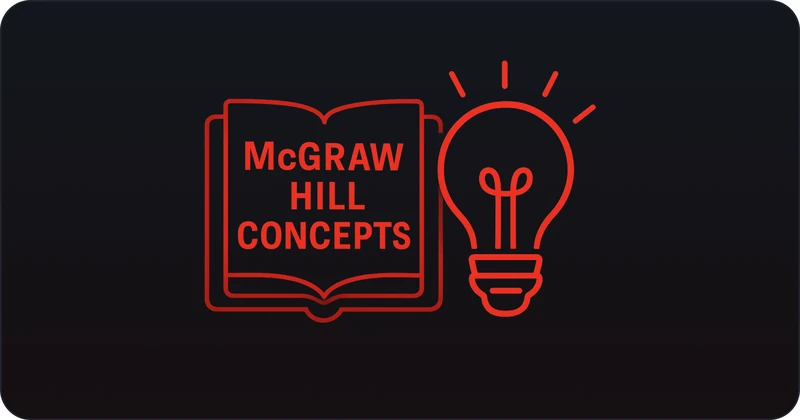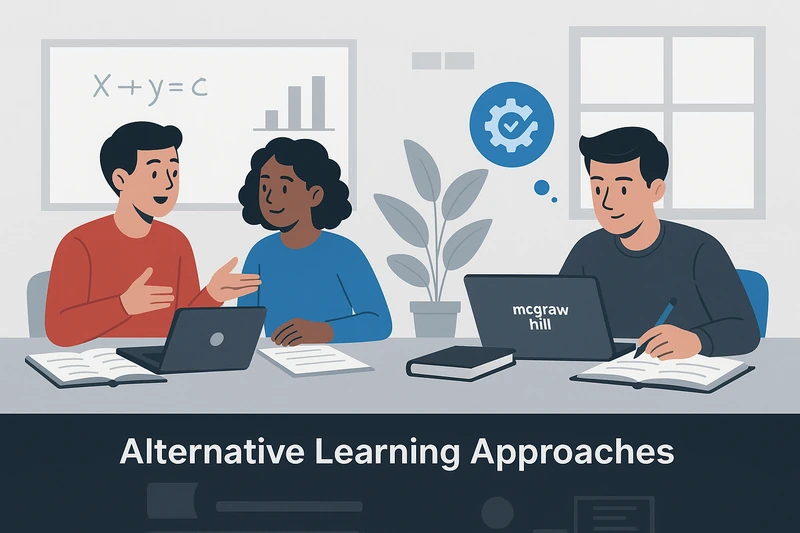Mastering McGraw Hill Concepts: A Complete Study Guide
Unlock the key concepts behind McGraw Hill Connect assignments and discover how SolveMyBook transforms complex topics into manageable learning experiences.

Understanding Core Learning Concepts
McGraw Hill Connect courses are built around fundamental concepts that form the foundation of each subject area. Understanding these core principles is essential for academic success and long-term retention of knowledge.
Educational research shows that students who focus on conceptual understanding rather than rote memorization achieve better grades and retain information longer. This approach transforms learning from a mechanical process into meaningful comprehension.
The SolveMyBook Advantage: Our extension doesn't just provide answers—it offers detailed explanations that help students understand the underlying concepts, creating a bridge between quick completion and genuine learning.
This conceptual approach is particularly valuable when working with educational videos and supplementary materials, as it helps students connect theoretical knowledge with practical applications across different subjects.
Fundamental Principles Across Subjects
Regardless of the specific subject matter, certain fundamental principles appear consistently across McGraw Hill Connect courses. These universal concepts form the backbone of academic learning and critical thinking.
Pattern Recognition: Most academic subjects involve identifying and understanding patterns, whether in mathematical equations, historical trends, scientific processes, or literary themes. SolveMyBook helps students recognize these patterns through comprehensive explanations.
Cause and Effect Relationships: Understanding how different factors influence outcomes is crucial across disciplines. From economic principles to scientific reactions, SolveMyBook's explanations highlight these important relationships.
Systems Thinking: Modern education emphasizes understanding how individual components work together within larger systems. This holistic approach is essential for tackling complex problems and real-world applications.
Building Strong Conceptual Frameworks
A strong conceptual framework serves as a mental scaffold that helps students organize new information and connect it to existing knowledge. This framework is essential for deep learning and academic success.
Hierarchical Understanding: Concepts build upon each other in a hierarchical structure. Basic principles support more complex ideas, which in turn enable advanced applications. SolveMyBook's explanations help students understand these connections.
Cross-Disciplinary Connections: Many concepts appear across multiple subjects with different applications. Understanding these connections helps students see the broader relevance of their learning and improves retention.
Practical Applications: The most effective learning occurs when students can see how abstract concepts apply to real-world situations. This connection makes learning more meaningful and memorable.
Effective Learning Strategies for Concept Mastery
Mastering concepts requires strategic approaches that go beyond simple memorization. These evidence-based strategies help students develop deep understanding and long-term retention.
Active Engagement: Passive reading or listening is insufficient for concept mastery. Students must actively engage with material through questioning, analysis, and application. SolveMyBook facilitates this by providing detailed explanations that encourage deeper thinking.
Spaced Repetition: Concepts require reinforcement over time to move from short-term to long-term memory. Regular review and application help solidify understanding and prevent forgetting.
Elaborative Interrogation: Asking "why" and "how" questions helps students understand the reasoning behind concepts. This deeper level of processing improves comprehension and retention.

Conceptual Problem-Solving Approaches
Effective problem-solving requires understanding the underlying concepts rather than memorizing specific procedures. This conceptual approach enables students to tackle novel problems and adapt to different contexts.
Principle-Based Thinking: Instead of memorizing steps, students should understand the principles that guide problem-solving. This understanding enables flexible application across different scenarios and question formats.
Analogical Reasoning: Drawing connections between similar problems or concepts helps students apply known solutions to new situations. This skill is particularly valuable in complex academic subjects.
Metacognitive Awareness: Understanding one's own thinking processes helps students identify when they truly understand a concept versus when they're simply following memorized procedures.
Leveraging Multimedia Resources for Concept Understanding
Modern educational platforms often incorporate various multimedia elements to enhance concept understanding. Learning to effectively utilize these resources can significantly improve comprehension and retention.
Visual Learning Support: Diagrams, charts, and visual representations help students understand complex concepts that might be difficult to grasp through text alone. These visual aids are particularly effective for spatial and quantitative concepts.
Interactive Elements: Interactive simulations and exercises allow students to experiment with concepts and see immediate results. This hands-on approach reinforces theoretical understanding through practical application.
Complementary Resources: Educational videos, like the one referenced from [YouTube](https://www.youtube.com/watch?v=jHkZF26G45E), can provide alternative explanations and perspectives that complement textbook material and help clarify difficult concepts.
SolveMyBook enhances this multimedia learning experience by providing instant context and explanations that help students connect different types of content and understand how they relate to assignment questions.
Preparing for Concept-Based Assessments
Modern assessments increasingly focus on conceptual understanding rather than rote memorization. Preparing for these assessments requires strategies that emphasize deep learning and flexible application of knowledge.
Synthesis and Integration: Assessments often require students to combine multiple concepts or apply them in novel contexts. Practice with integration helps students develop this crucial skill.
Explanation and Justification: Many assessments ask students to explain their reasoning or justify their answers. This requires deep conceptual understanding beyond simple recall.
Transfer and Application: The ability to apply learned concepts to new situations is a key indicator of mastery. SolveMyBook's detailed explanations help students understand the transferable principles behind specific examples.
Collaborative Concept Development
Learning concepts is often enhanced through collaboration and discussion with peers. This social dimension of learning helps students refine their understanding and discover new perspectives.
Peer Explanation: Explaining concepts to others helps students identify gaps in their own understanding and reinforces their knowledge through articulation.
Diverse Perspectives: Different students may understand the same concept in different ways, and sharing these perspectives can enrich everyone's understanding.
Question Generation: Working with peers to generate questions about concepts helps students think more deeply about the material and identify important relationships.
Technology-Enhanced Concept Learning
Modern technology offers powerful tools for concept learning and understanding. When used effectively, these tools can accelerate learning and improve comprehension across all subjects.
Adaptive Learning Systems: Technology can personalize learning experiences based on individual student needs and progress, ensuring that conceptual gaps are addressed efficiently.
Immediate Feedback: Digital tools can provide instant feedback on understanding, helping students identify and correct misconceptions before they become entrenched.
SolveMyBook Integration: Our extension represents the next evolution in educational technology, combining instant answer provision with detailed conceptual explanations that support genuine learning alongside efficient completion.

Building Long-Term Conceptual Understanding
The ultimate goal of concept learning is long-term retention and the ability to apply knowledge in future contexts. This requires strategies that go beyond immediate assignment completion.
Regular Review and Reinforcement: Concepts require periodic review to maintain accessibility in long-term memory. Spaced repetition schedules help optimize this process.
Progressive Complexity: Understanding develops gradually from basic to advanced levels. Each stage builds upon previous knowledge, creating a robust conceptual foundation.
Real-World Connections: Connecting academic concepts to real-world applications helps students see the relevance and importance of their learning, improving motivation and retention.
SolveMyBook supports this long-term learning process by providing explanations that help students understand not just what the answer is, but why it's correct and how it connects to broader conceptual frameworks.
